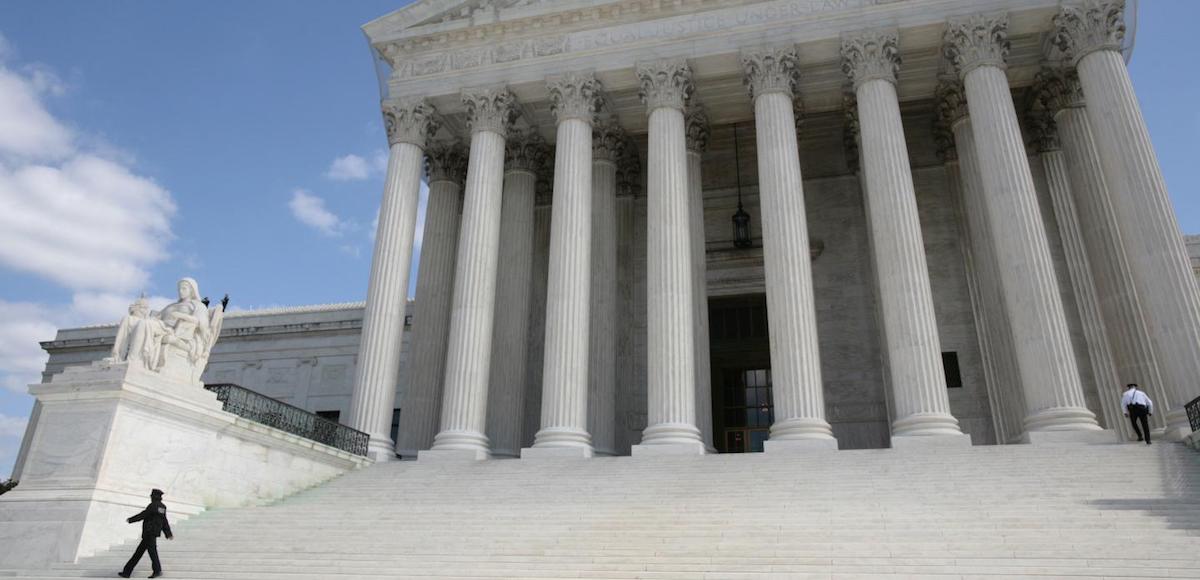

File Photo: The U.S. Supreme Court (SCOTUS). (Photo: Reuters)
The U.S. Supreme Court (SCOTUS) ruled 7 – 2 on Monday President Donald Trump can fully enforcement his travel ban on six majority-Muslim countries. The two short briefs (available here and here), which represent a major victory for the White House, comes after nearly a year of legal challenges and judicial activism in lower courts.
Leftwing liberal Justices Ruth Bader Ginsburg and Sonia Sotomayor said they would have left the lower court orders in place. However, the overwhelmingly majority ruled late Monday afternoon that the lower court rulings which partly blocked the ban should be put on hold while appeals courts in Richmond, Va., and San Francisco, Calif., take up the case.
The 9th Circuit Court of Appeals, the most liberal and overturned court in the land, is scheduled to hear oral argument on Wednesday. Oral argument are scheduled to follow in the 4th Circuit on Friday.
In one sentence in the ruling, the High Court clearly warned the liberal justices on those courts, stating “we expect that the Court of Appeals will render its decision with appropriate dispatch.”
After a series of legal challenges in judge-shopped courts known for their leftwing activism, the Court twice previously sided with the Trump Administration and permitted it to go forward until oral arguments were heard on October 10, 2017. On June 26, the Court unanimously and largely reinstated the travel ban until oral arguments were heard, though they left it open to limitation.
But on September 12, the Court granted the Trump Administration’s request to block a lower court ruling allowing them to more strictly enforce the order. Shortly after, the White House announced an expansion of the travel ban to include 8 nations that did not meet new security standards developed by the Department of Homeland Security (DHS).
As a result, the proclamation also placed certain travel limitations and restrictions on travelers from North Korea, Chad, Iran, Libya, Somalia, Syria, Venezuela and Yemen.
The People’s Pundit Daily (PPD Poll) Big Data Poll has repeatedly found majority support for President Trump’s executive order. He issued it within days of being inaugurated and rewrote it in an attempt to address the concerns of the 9th Circuit.
The “Executive Order Protecting The Nation From Foreign Terrorist Entry Into The United States” cited the president’s authority granted by the U.S. Constitution and the U.S. Congress, specifically the Immigration and Nationality Act (INA) of 1952.
Whenever the President finds that the entry of any aliens or of any class of aliens into the United States would be detrimental to the interests of the United States, he may by proclamation, and for such period as he shall deem necessary, suspend the entry of all aliens or any class of aliens as immigrants or nonimmigrants, or impose on the entry of aliens any restrictions he may deem to be appropriate.
However, unlike the first order, it detailed categories of people eligible to enter the United States for business or medical travel purposes. It also no longer suspended Syrian refugee admissions indefinitely and excluded Iraq. Still, lawyers for the state of Hawaii, the most liberal state in the country, moved for a temporary restraining order on March 15, the day before the new executive order was supposed to take effect.
The initial executive order came on the heels of the DHS revealing nearly a third of the 1,000 domestic terrorism cases currently being investigated by the Federal Bureau of Investigation (FBI) involve those admitted to the U.S. as refugees.
Officials said some of those 300 came to “infiltrate” the U.S., while others were radicalized once they were in the country. The report represented the first official solid tie between the refugee resettlement program and an increase in domestic terrorism.
The most damning journalistic sin committed by the media during the era of Russia collusion…
The first ecological study finds mask mandates were not effective at slowing the spread of…
On "What Are the Odds?" Monday, Robert Barnes and Rich Baris note how big tech…
On "What Are the Odds?" Monday, Robert Barnes and Rich Baris discuss why America First…
Personal income fell $1,516.6 billion (7.1%) in February, roughly the consensus forecast, while consumer spending…
Research finds those previously infected by or vaccinated against SARS-CoV-2 are not at risk of…
This website uses cookies.